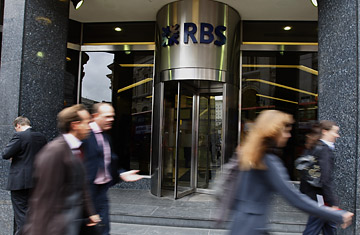
People walk past a branch of the Royal Bank of Scotland in London
Less than a week after the British government sketched an $850 billion plan to steady a nervous banking sector and kick-start a recovery, the details are emerging. Following a flurry of meetings over the weekend, the British Treasury said Monday that it plans to spend as much as $63 billion bolstering the capital bases of three of the country's largest banks, partially nationalizing once mighty lenders in the process. "Today's plan is unprecedented," British Prime Minister Gordon Brown said at a Downing Street press conference, "but essential for all of us."
The fruits of tense negotiations between the government and British lenders — talks given added urgency by the meltdown in global markets at the end of last week — the bailout is breathtaking for its scale. British taxpayers are on the hook for a $34 billion investment in the Royal Bank of Scotland (RBS), Britain's second-largest lender, a cash injection amounting to almost double the bank's current market capitalization. Most of the investment will take the form of ordinary shares, which private investors are invited to purchase along with the government. But under the deal, those shares yield no dividends until the government recoups its stake, which it will hold in non-voting preference shares. So no one is expecting many private takers, leaving the government shouldering around 60% of RBS. At Lloyds TSB and HBOS — rival U.K. lenders in the midst of a merger — plans to offer as much as $29 billion in fresh funds would give the government roughly 40% of the combined group.
Despite those big stakes, the government is not interested in running the banks; its shares, the Treasury made clear Monday, would eventually be sold off "in an orderly way." But with voters baying for the blood of Britain's bankers, the government was careful to secure concessions in return for taxpayers' money. There'll be no cash bonuses for execs of the three institutions this year (though their annual salaries, all upwards of $1.5 million, will remain intact). Future remuneration will be more closely tied to the banks' long-term performance. Government-appointed directors will join the lenders' boards. And, crucially for the wider British economy, the banks have pledged to boost lending to homeowners and small businesses to last year's levels.
For bosses at RBS, the bailout will be particularly humiliating. Only last April, the Edinburgh-based bank called on investors for some $20 billion in much-needed capital, after subprime-related losses — and an ill-timed takeover last year of Dutch bank ABN Amro — blew a big hole in its balance sheet. "It's immensely regretful we're coming to shareholders to raise funds again," said RBS chairman Tom McKillop. "It's something we feel bad about." So bad, in fact, that McKillop now plans to quit next year; RBS CEO Fred Goodwin resigned Monday, as did his counterpart at HBOS.
The effort to revive Britain's flagging banking sector has reversed the government's fortunes. Prime Minister Brown's broadly popular plan — which includes extra liquidity for banks and government guarantees for their debt — has inspired similar rescue packages across Europe. Still, one model won't fit all. "Some countries consider they don't have an insolvency problem, and are focusing more on providing guarantees to improve liquidity in the markets," says Antonio Ramirez, banking analyst at Keefe, Bruyette & Woods in London. (On Monday, for instance, Spain said it would guarantee new bank debt until the end of 2009.) But "the problems in terms of capital requirements of U.K. banks seem to be much higher than what they eventually could be in other countries," Ramirez says. "They have a solvency issue, and that's been complicating the funding issue; the medicine does not have to be the same."
But it does need to be effective. Following the British bailout, the three British banks will now have capital ratios above 9%, by the most important measure, well above international minimum requirements — "a level that should put them on a strong footing for the future," the Treasury reckoned in a statement. Having bet big, the government, for one, will be hoping that stronger future arrives soon.
(Click here to see photos of how London faces painful and uncertain times.)
